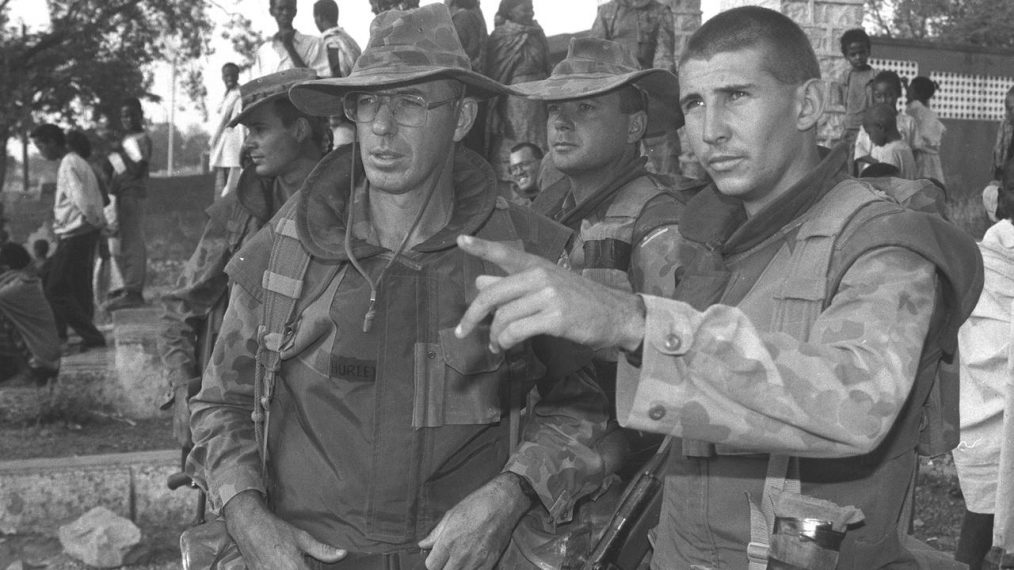
From the City of Death to a Legacy of Honour: 1RAR’s Role in Operation Solace Remembered
Stepping onto the dusty, dimly lit streets of Baidoa, Somalia, at 3am was like entering another world for newly promoted Corporal Terry Conner. It was January 1993, and his section was spearheading the first patrol of Operation Solace, Australia’s response to a dire humanitarian crisis unfolding thousands of kilometres from home.
“Everything was different, the smells, the people,” Mr Conner recalled. “There were meat markets and stalls, but they didn’t have a great deal of stuff. It wasn’t until you went out into the villages that you really saw they were definitely suffering.”
Over the following 17 weeks, soldiers of the 1st Battalion, the Royal Australian Regiment (1RAR), would face scorching heat, sporadic gunfire from militia, and the daily toll of famine and civil war. Deployed under the US-led United Task Force, their mission was to stabilise the region, provide security for humanitarian aid, and restore some semblance of order in a country devastated by the collapse of the Somali Democratic Republic in 1991.
Rapid Deployment, Steep Learning Curve
For Corporal Conner and many others, the deployment came with little notice. He was in the field when he received the call to prepare for an overseas mission, destination unknown. Preparation was condensed into a whirlwind of briefings, equipment checks, and a final Christmas dinner with family before boarding HMAS Jervis Bay on Christmas Eve.
“I didn’t have an idea where Somalia was, and no idea what was occurring there at all,” he said.
During the 28-day sea transit, the infantrymen trained intensively and received daily briefings on the escalating situation they were heading into. By 17 January 1993, they were boots on the ground in Baidoa, then known as “the city of death”, the epicentre of the 1992 famine.
Despite having trained primarily in jungle warfare back home, the soldiers quickly adapted to the demands of urban and town patrolling. “Our training had been excellent,” Mr Conner said. “The fundamentals of soldiering and patrolling were still used, we just had to tweak it a bit.”
Relentless Patrols, Human Toll
The battalion established a punishing routine, three-hour patrols every three days, interspersed with brief rest periods often filled with planning and camp duties. Security operations included the confiscation of over 1000 weapons from Somali militia and the protection of food convoys and distribution points. With no reliable maps, soldiers painstakingly hand-drew operational diagrams to identify key landmarks and NGO facilities.
More than 1100 patrols were conducted during the deployment.
But it wasn’t just the danger of firefights that left a lasting impression, it was the desperation of the Somali people.
“We treated people at checkpoints who had been shot in the chest. Children who’d been wounded playing with explosives. There was one girl who had her hand blown off,” Mr Conner remembered sombrely.
Initially wary of the foreign troops, local Somalis gradually warmed to the Australians. Through countless acts of compassion and professionalism, trust was slowly built. Operation Solace is widely regarded as a success, with improved food security and the first steps towards rebuilding Baidoa.
Recognition and Reflection
Tragically, the deployment was not without loss. Lance-Corporal Shannon McAliney was killed by accidental fire while on patrol, a sombre reminder of the risks even in non-combat operations.
More than 900 Australian troops served in Operation Solace, including units from the 3rd/4th Cavalry Regiment, 4th Field Regiment, 3rd Combat Engineer Regiment and 103rd Signals Squadron. Their collective efforts were recently recognised when the 1RAR battalion group was awarded the Meritorious Unit Citation for “outstanding professionalism and exemplary conduct.”
The award was formally presented by Governor-General Sam Moyston during a commemorative parade at Lavarack Barracks on 7 April. In a moving gesture, veterans of the Somalia deployment were invited to present the citation to current serving members of 1RAR.
Lieutenant Colonel Benedict Farrell, Commanding Officer of 1RAR, reflected on the significance of the honour.
“This is of major significance to 1RAR,” he said. “We are the stewards of the battalion and we maintain the customs and traditions set by those before us. It’s not just about remembering their deployment, but also for a lot of the soldiers, their friends they’ve lost over the last 30 years.”
Honouring Individual Bravery
Among those recognised individually for their exceptional service during Operation Solace was Corporal Thomas Aitken, who was awarded the Distinguished Service Medal (DSM). His bravery under fire during a tense exchange with Somali militia, in which he protected both civilians and fellow soldiers, exemplified the highest standards of courage and composure. His citation noted his “extraordinary devotion to duty in circumstances of great peril.”
Corporal Aitken’s legacy serves as a reminder of the quiet heroism that defined Australia’s mission in Somalia, professional, compassionate, and determined.
A Career and Legacy
For Mr Conner, Somalia marked a turning point in a distinguished 28-year career, which later included deployments to Timor and Afghanistan. Yet, the memory of Operation Solace stands out.
“The entire group, not just us infantry boys, had to adapt and change a lot of the ways we were used to doing things,” he said. “But at the same time, we maintained the fundamentals of how we did our jobs. I think everyone’s quite proud of what we did and very grateful that there has been recognition.”
Three decades on, the memories of Baidoa remain etched in the minds of those who served, but so too does the pride in a mission that made a difference, in a place that needed it most.



